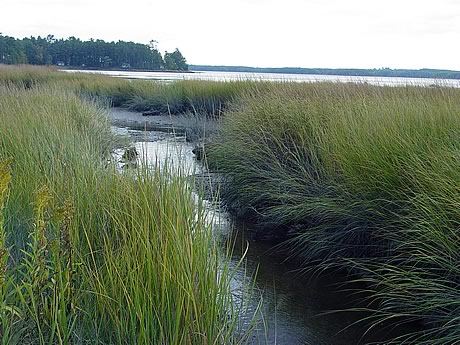
Salt Marsh Creek at Great Bay National Wildlife Refuge, Newington, NH.
Credit: Katherine Whittemore/USFWS
|
Vision: (vision for the future, future desired condition)
Landscapes that sustain our natural resources and cultural heritage maintained in a healthy state through active collaboration of conservation partners and partnerships in the North Atlantic region.
Mission Statement:
(purpose of LCC)
The North Atlantic Landscape Conservation Cooperative provides a partnership in which the private, state, tribal and federal conservation community works together to address increasing land use pressures and widespread resource threats and uncertainties amplified by a rapidly changing climate. The partners and partnerships in the cooperative address these regional threats and uncertainties by agreeing on common goals for land, water, fish, wildlife, plant and cultural resources and jointly developing the scientific information and tools needed to prioritize and guide more effective conservation actions by partners toward those goals.
Components and Goals (what the LCC does)
Coordination and Organization: Provide structure, staff and process that brings together and coordinates partners, develops consensus on common goals (resource outcomes), builds on and integrates existing partnerships and capacity, leverages and generates funding and other resources, prioritizes and develops scientific information and tools to make conservation more effective and evaluates progress towards resource outcomes by partners and partnerships within the LCC area and as part of the LCC national network.
Ecological Planning: Compile, organize and provide information from existing partners and partnerships on status, trends, current and emerging threats and limiting factors for priority fish, wildlife and plant species and cultural resources; agree on regional objectives for these species and resources; and assess their relationship to limiting factors, habitats and landscapes to provide a scientific basis for conservation actions.
Conservation Design: Develop and provide tools and information to guide decision makers and inform conservation actions to more effectively address threats, limiting factors and uncertainties and efficiently achieve objectives and ensure functional systems under current and predicted future conditions and link site-scale actions to landscape and regional scale goals.
Conservation Adoption and Delivery: Assist partners with use of science and tools and work with partners to implement actions to test, validate and improve scientific information and tools developed by the LCC to enhance the ability of our lands and waters to sustain fish, wildlife, plant, cultural resources and unique ecosystems.
Monitoring and Evaluation: Facilitate monitoring of populations, resources, habitats and landscapes and tracking of conservation actions designed to assess the effectiveness of conservation actions, assess progress towards common goals and guide future planning and actions based on the results.
Research: Facilitate the pursuit and support of priority research activities based on needs identified and prioritized by partners and partnerships that test key assumptions in planning and inform future planning and delivery; provide guidance to Climate Science Centers on climate science needed by the LCC; and work with partners to coordinate ongoing research initiatives on priority conservation issues.
Communication and Outreach: Develop effective communication products to enhance communications among partners and partnerships, develop and sustain the LCC partnership, attract new partners, support existing funding and seek new funds, improve internal and external relations, and raise awareness of LCC priorities targeted to specific audiences.
Information Management: Compile, synthesize, organize and make available information, data, science and tools developed by partners and partnerships and the LCC in scales and formats needed by partners.
More Information About the North Atlantic LCC